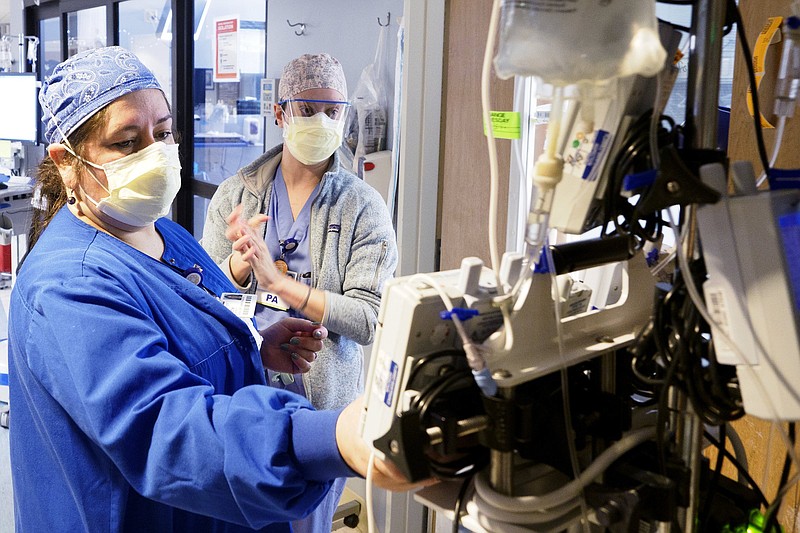Tennessee's latest COVID-19 surge continues to gain steam and is now straining hospitals, which are struggling to navigate staffing shortages along with a higher patient burden, the state's top health official said Monday.
"We have had a very sharp uptick in cases over the last several weeks - we've had just a 204% increase just in the last week. We are still in that upward trajectory, and right now, there are no signs of that slowing," Tennessee Health Commissioner Dr. Lisa Piercey said during a news briefing Monday.
The state's seven-day average for new cases was 2,325 per day as of Aug. 1, with a statewide test positivity rate nearing 15%. This time last month, Tennessee was averaging 224 new cases a day over the past week with a positivity rate below 3%.
"There are some indications that this may slow down in a few weeks, based on some experience overseas, but there's no guarantee of that. And so we have to put all hands on deck right now to make sure people are protected," Piercey said.
No area of the state is spared from the current outbreak, and cases are predominantly due to the highly contagious delta variant, according to Piercey. She said that variant now accounts for more than 80% of total new cases of COVID-19 in Tennessee.
Case spikes are typically followed by an increase in hospitalizations and deaths, and Piercey said this latest surge is no exception.
"We now have well over 1,000 Tennesseans hospitalized statewide," she said, noting that that's around the same level as the tail end of the winter surge in February, and warning that a spike in deaths is expected to follow in the coming weeks.
The state's dwindling hospital capacity is due to an increased burden of COVID-19 patients combined with staffing shortages and a higher number of admissions for other respiratory viruses that normally don't circulate in the summer.
"It's not because they're overrun with COVID patients, necessarily, but because they are having significant workforce and staffing challenges," Piercey said.
The other illnesses causing increased hospitalizations, such as respiratory syncytial virus (RSV) and parainfluenza, predominantly affect children and normally flare up in winter months, Piercey said. However, those viruses were likely kept at bay this past year by widespread use of face masks and social distancing but are on the rise now that many in-person activities have resumed without mitigation measures.
"We've got more children hospitalized now with RSV than we hardly ever see in the summertime," she said.
The vast majority of those hospitalized and dying due to the coronavirus at this point are unvaccinated.
The state's worsening COVID-19 outbreak prompted the Tennessee Medical Association to issue a statement Monday about the state's low COVID-19 vaccination rate.
"These vaccines are a means to protect our citizenry and greatly enhance one's ability to fend off potentially grave health implications from the delta variant," the statement reads. "We implore those Tennesseans who have not received a COVID vaccination to do so immediately. This simple task may be the difference between a few days of fever and fatigue versus a few weeks in the hospital, permanent disability, or even death. And to those responsible for taking care of patients, it is your duty to protect yourself as well as your patients."
Tennessee remains below the national rate of around 50% of the population vaccinated with only 39% of residents fully vaccinated.
"Most recent data available show that 96% of all new cases in Tennessee are among unvaccinated individuals and 96.9% of all COVID-19 deaths were unvaccinated individuals," according to the Tennessee Medical Association statement.
Piercey said 80% of "breakthrough infections," which occur when fully vaccinated people become infected with COVID-19, in Tennessee that resulted in hospitalizations are in people age 65 and up. That's because older people's immune systems are less robust and often don't respond as strongly to vaccines as younger people.
"So, if you are immunocompromised - you have a weakened immune system - and maybe you can't mount a normal immune response for whatever reason, or if you're advanced age, you may be at higher risk and want to take other protections," she said.
Although there's "conflicting and confusing messaging" surrounding COVID-19 vaccines and their effectiveness, Piercey said "the vaccine is the single best tool we have to fight COVID-19."
Some positive news, she said, is that more Tennesseans are choosing to get vaccinated.
"Our vaccine uptake in Tennessee is up 22% week-over-week, from 62,000 a week to 76,000 a week," she said. "That means some Tennesseans - a lot of Tennesseans who have been hesitant - are now saying, 'You know what, I'm ready.' And there's a lot of different reasons for that, but at the end of the day, we have been vaccinating more Tennesseans, and that is very encouraging."
Contact Elizabeth Fite at efite@timesfreepress.com or follow her on Twitter @ecfite.
